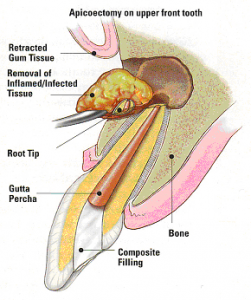 The most common endodontic surgical procedure is called an apicoectomy or root-end resection. When inflammation or infection persists in the bony area around the end of your tooth after endodontic treatment, your endodontist may perform an apicoectomy.
The most common endodontic surgical procedure is called an apicoectomy or root-end resection. When inflammation or infection persists in the bony area around the end of your tooth after endodontic treatment, your endodontist may perform an apicoectomy.
In this procedure, the endodontist opens the gum tissue near the tooth to expose the underlying bone, and the infected tissue is removed. The very end of the root is also removed, and a small filling may be placed to seal the root canal. Local anesthetics make the procedure comfortable, and most patients return to their normal activities the next day.
You are probably reading this site because your endodontist believes Endodontic Surgery may help save your tooth.
To understand Endodontic Surgery, it helps first to know something about the nonsurgical endodontic procedure, or “root canal.” A root canal is necessary when the soft inner tissue, or “pulp,” of the tooth becomes inflamed or infected. This may happen as a result of deep decay, repeated dental procedures on the tooth, or a blow to the tooth. Endodontic treatment removes the damaged pulp. Then the tooth’s canal are cleaned and filled to help preserve the tooth.
In a few cases, however, nonsurgical endodontic treatment alone cannot save the tooth. In such a case, your dentist or endodontist may recommend surgery.
Who performs endodontic surgery?
Endodontists are dentists with at least two additional years of advanced education and training in root canal techniques and procedures. In addition to treating routine cases, they are experts in performing complicated procedures including surgery. They often treat difficult cases – such as teeth with unusual or complex root structure or small, narrow canals. This special training and experience can be very valuable when endodontic surgery is necessary.
Who performs endodontic surgery?
No matter how effective modern tooth replacements are-and they can be very effective-nothing is as good as a natural tooth. You’ve already made an investment in saving your tooth. The pay-off for choosing endodontic surgery could be a healthy, functioning natural tooth for the rest of your life.
Why would I need endodontic surgery?
Surgery may be used in diagnosis. If you have persistent symptoms but mo problems appear on your x-ray, your tooth may have a tiny fracture or canal that could not be detected during nonsurgical treatment. In such a case, surgery allows your endodontist to examine the root of your tooth, find the problem, and provide treatment.
Sometimes calcium deposits make a canal too narrow for the cleaning and shaping instruments used in nonsurgical root canal treatment to reach the end of the root. If your tooth has this “calcification,” your endodontist may perform endodontic surgery to clean and seal the remainder of the canal.
Usually, a tooth that has undergone a root canal can last the rest of your life and never need further endodontic treatment. However, in a few cases, a tooth may fail to heal. The tooth may become painful o diseased months or even years after successful treatment. If this is true for you, surgery may help save your tooth.
Surgery may also be performed to treat damaged root surfaces or surrounding bone. Although there are many surgical procedures that can be performed to save a tooth, the most common is called apicoectomy or root-end resection. When inflammation or infection persists in the bony area around the end of your tooth after a root canal procedure, your endodontist may have to perform an apicoectomy.
What is apicoectomy?
A small filling may be placed to seal the end of the root canal, and a few stitches or sutures are placed in the gum to help the tissue heal properly.
Over a period of months, the bone heals around the end of the root.
Are there other types of endodontic surgery?
In very complex cases, a procedure called intentional replantation may be performed. In this procedure, a tooth is extracted, treated with an endodontic procedure while it is out of mouth, and then replaced in its socket. These procedures are designed to help save your tooth.
Will the procedure hurt?
Your endodontist will give you specific postoperative instructions to follow. If you have questions after your procedure, or if you have pain that does not respond to medication, call your endodontist.





